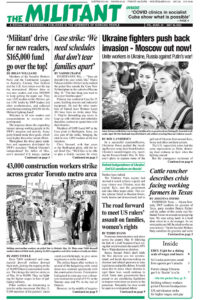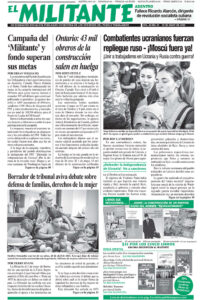Numerous demonstrations took place across the country May 14 following the leak of a draft Supreme Court ruling that would overturn the court’s 1973 Roe v. Wade decision on abortion.
Justice Samuel Alito’s draft holds the Roe decision was not constitutional, and hands decision-making on abortion and related questions to state legislatures and public debate. It would mean that in states where abortion is legal those laws would continue to stand. Some state governments have passed or are considering legislation to impose restrictions on access to the procedure. Nationally the door would be open to a widespread debate.
But the heart of the discussion has to be put on a broader basis. The key question isn’t abortion. It’s how to organize working people to defend ourselves and make gains amid a broader capitalist crisis that is making it harder to start a family and to hold one together. This includes the fight for jobs, adequate wages, protection against soaring inflation, accessible and affordable health care, child care, access to family planning, including adoption, as well as access to contraception and safe and secure abortion when needed.
Liberals and middle-class radicals, however, oppose this course. They think working people are “deplorables” and fear a fight to win public opinion. They want to shut down discussion and show disdain for the rights and opinions of others.
“To put the right to have an abortion up for debate,” New York Times columnist Jamelle Bouie says, “degrades” women. But it’s the liberals’ refusal to discuss this and all the related questions that have aided opponents of women’s rights in systematically restricting access to the procedure ever since Roe was pushed through in 1973.
Harder today to set up a family
Millions are out of work today, or unable to get sufficient hours to provide for their families. The bosses are imposing longer workdays, forced overtime and speedup, leaving less and less time for family life. This is a central issue in most strikes today, alongside relief from the crushing impact of rampant inflation.
Living paycheck to paycheck, millions were struggling to pay bills even before recent price hikes. Inflation is running officially at 8.3%, but prices are actually far higher on the essentials that make up a greater part of workers’ expenses.
Average mortgage payments are now $1,800 a month, 70% higher than before the pandemic and the highest since 2007. If the bubble in house prices bursts, millions of home “owners” will owe more in outstanding loans than the value of “their” house. Defaults on mortgage payments and foreclosures loom.
At the same time, workers who rent face large increases as landlords seek to boost profits. Evictions are on the rise. More young workers and students are moving back in with their parents. And so too are the elderly, especially after the horrors they faced in the capitalist death traps called nursing homes during the pandemic. The possibility of young people putting a family together is harder and harder.
In the past weeks parents in large parts of the U.S. have been forced on a desperate hunt for baby formula as an acute shortage unfolds. Abbott Laboratories is a key supplier, having crushed its competition. It recalled several products, and the government had no provision for reserves to make up the shortfall.
Under capitalism, the family is one of the key institutions workers have to defend ourselves and our loved ones, in the face of all the assaults of bosses, landlords and government regulators. In the face of the long-term capitalist crisis, many workers are putting off forming families. Women face harder and harder decisions about when and whether to bear a child and how many to have.
Today, growing numbers of workers are stricken with drug addiction, alcoholism and mental problems. Then they run into the cops, courts and capitalist “justice” system. These burdens fall on all workers, but especially on workers who are Black.
The wealthy capitalist rulers face none of these pressures. As long as they have sufficient labor to exploit, they have no interest in making it easier for workers to maintain a family. Their concern is to find ways to undermine solidarity among working people and pit us against each other, as they drive to profit off our backs.
The consequences of the crumbling of working-class families was described by New York Sen. Daniel Patrick Moynihan in the early 1990s. He spoke out against then-President Bill Clinton’s decision to “end welfare as we know it,” which included slashing government programs for single mothers and their children. Families in Black communities headed by single mothers, without jobs and with less and less federal assistance, Moynihan said, would be unable to provide stable support for children, with disastrous consequences.
What Moynihan described for African American families then is what increasingly faces the working class as a whole today. It is the inevitable consequence of a social system based on capitalist exploitation.
“All of these questions are class questions,” said Sara Lobman, Socialist Workers Party candidate for U.S. Senate from New York. “The road forward is to organize a working-class battle to defend our livelihoods, our families and control over the conditions we live in. This is the framework to advance the fight for access to child care and family planning, including when a woman finds herself with the need to have an abortion.”

